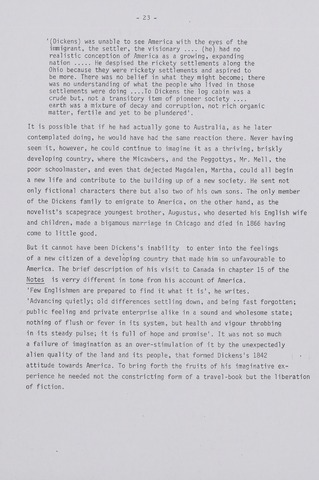'(Dickens) was unable to see America with the eyes of the
immigrant, the settler, the visionary (he), had no
realistic conception of America as a growing, expanding
nation He despised the rickety settlements along the
Ohio because they were rickety settlements and aspired to
be more. There was no belief in what they might become; there
was no understanding of what the people who lived in those
settlements were doing ....To Dickens the log cabin was a
crude but, not a transitory item of pioneer society
earth was a mixture of decay and corruption, not rich organic
matter, fertile and yet to be plundered'.
It is possible that if he had actually gone to Australia, as he later
contemplated doing, he would have had the same reaction there. Never having
seen it, however, he could continue to imagine it as a thriving, briskly
developing country, where the Micawbers, and the PeggottysMr. Mel 1the
poor schoolmaster, and even that dejected Magdalen, Martha, could all begin
a new life and contribute to the building up of a new society. He sent not
only fictional characters there but also two of his own sons. The only member
of the Dickens family to emigrate to America, on the other hand, as the
novelist's scapegrace youngest brother, Augustus, who deserted his English wife
and children, made a bigamous marriage in Chicago and died in 1866 having
come to little good.
But it cannot have been Dickens's inability to enter into the feelings
of a new citizen of a developing country that made him so unfavourable to
America. The brief description of his visit to Canada in chapter 15 of the
Notes is verry different in tone from his account of America.
'Few Englishmen are prepared to find it what it is', he writes.
'Advancing quietly; old differences settling down, and being fast forgotten;
public feeling and private enterprise alike in a sound and wholesome state;
nothing of flush or fever in its system, but health and vigour throbbing
in its steady pulse; it is full of hope and promise'. It was not so much
a failure of imagination as an over-stimulation of it by the unexpectedly
alien quality of the land and its people, that formed Dickens's 1842
attitude towards America. To bring forth the fruits of his imaginative ex
perience he needed not the constricting form of a travel-book but the liberation
of fiction.
- 23 -

